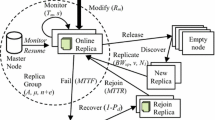Abstract
Virtual worlds have become the arena for many entertainment, social, and business activities and provided a platform for user content generation. To protect user innovation, persistency is an important property. Unfortunately, existing virtual worlds, owned by some entities, are not immune from death due to entity failure. To provide a persistent virtual world, a decentralized architecture is explored, which is constructed on user contributed devices. However, there are many challenges to realize a decentralized virtual world. One important issue is user cooperation in reliable content storage. The devices contributed by users may not be reliable for maintaining all user contents, but users do not have the incentive to provide reliable devices for others. This paper addresses the issue by two steps. First, an indicator is provided to users, called replica group reliability which is based on the proposed replicability index. Based on the indicator, users can learn the reliability of their content storage. Then, a new user incentive mechanism, called equity-based node allocation strategy, is proposed to promote user cooperation to collectively maintain reliable content storage. A decentralized algorithm implementing the strategy is designed and the evaluation results show its effectiveness and efficiency.
Access this chapter
Tax calculation will be finalised at checkout
Purchases are for personal use only
Similar content being viewed by others
References
Dionisio, J.D.N., Gilbert, R.: 3D virtual worlds and the Metaverse: current status and future possibilities. ACM Comput. Surv. (CSUR) 45(3), 34 (2013)
Tredinnick, L.: Virtual realities in the business world. Bus. Inf. Rev. 35(1), 39–42 (2018)
Poppe, E., Brown, R., Recker, J., Johnson, D., Vanderfeesten, I.: Design and evaluation of virtual environments mechanisms to support remote collaboration on complex process diagrams. Inf. Syst. 66, 59–81 (2017)
Zhou, M., Leenders, M.A., Cong, L.M.: Ownership in the virtual world and the implications for long-term user innovation success. Technovation (2018)
Shen, B., Guo, J., Li, L.X.: Cost optimization in persistent virtual world design. Inf. Technol. Manage. 19(3), 155–169 (2018)
Lua, E.K., Crowcroft, J., Pias, M., Sharma, R., Lim, S.: A survey and comparison of peer-to-peer overlay network schemes. IEEE Commun. Surv. Tutorials 7(1–4), 72–93 (2005)
Adams, J.S.: Towards an understanding of inequity. J. Abnorm. Soc. Psychol. 67(5), 422 (1963)
Austin, W., Walster, E.: Reactions to confirmations and disconfirmations of expectancies of equity and inequity. J. Pers. Soc. Psychol. 30(2), 208 (1974)
Krishnan, R., Smith, M.D., Telang, R.: The economics of peer-to-peer networks. Available at SSRN 504062 (2003)
Adar, E., Huberman, B.A.: Free riding on Gnutella. First Monday 5(10) (2000)
Hardin, G.: The tragedy of the commons. J. Nat. Resour. Policy Res. 1(3), 243–253 (2009)
Oualha, N., Roudier, Y.: Peer-to-Peer Storage: Security and Protocols. Nova Science Publishers Inc., New York (2010)
Liu, W., Peng, D., Lin, C., Chen, Z., Song, J.: Enhancing tit-for-tat for incentive in BitTorrent networks. Peer-to-peer Network. Appl. 3(1), 27–35 (2010)
Lillibridge, M., Elnikety, S., Birrell, A., Burrows, M., Isard, M.: A cooperative internet backup scheme. In: Proceedings of the Annual Conference on USENIX Annual Technical Conference, p. 3. USENIX Association, June 2003
Shen, H., Lin, Y., Li, Z.: Refining reputation to truly select high-QoS servers in peer-to-peer networks. IEEE Trans. Parallel Distrib. Syst. 24(12), 2439–2450 (2012)
Oualha, N., Roudier, Y.: Securing P2P storage with a self-organizing payment scheme. In: Data Privacy Management and Autonomous Spontaneous Security, pp. 155–169. Springer, Heidelberg (2010)
Vishnumurthy, V., Chandrakumar, S., Sirer, E.G.: Karma: a secure economic framework for peer-to-peer resource sharing. In: Workshop on Economics of Peer-to-peer Systems, vol. 35, no. 6, June 2003
Adams, J.S.: Inequity in social exchange. In: Advances in Experimental Social Psychology, vol. 2, pp. 267–299. Academic Press (1965)
Messe, L.A., Dawson, J.E., Lane, I.M.: Equity as a mediator of the effect of reward level on behavior in the Prisoner’s Dilemma game. J. Pers. Soc. Psychol. 26(1), 60 (1973)
Radinsky, T.L.: Equity and inequity as a source of reward and punishment. Psychon. Sci. 15(6), 293–295 (1969)
Wicker, A.W., Bushweiler, G.: Perceived fairness and pleasantness of social exchange situations: two factorial studies of inequity. J. Pers. Soc. Psychol. 15(1), 63 (1970)
Schmitt, D.R., Marwell, G.: Withdrawal and reward reallocation as responses to inequity. J. Exp. Soc. Psychol. 8(3), 207–221 (1972)
Donald, E.K.: The art of computer programming. Sorting Searching 3, 426–458 (1999)
Knoll, M., Wacker, A., Schiele, G., Weis, T.: Bootstrapping in peer-to-peer systems. In: 2008 14th IEEE International Conference on Parallel and Distributed Systems, pp. 271–278. IEEE, December 2008
Acknowledgement
This research is partially supported by the University of Macau Research Grant No. MYRG2017-00091-FST.
Author information
Authors and Affiliations
Corresponding author
Editor information
Editors and Affiliations
Rights and permissions
Copyright information
© 2020 Springer Nature Switzerland AG
About this paper
Cite this paper
Shen, B., Guo, J., Tan, W. (2020). An Equity-Based Incentive Mechanism for Decentralized Virtual World Content Storage. In: Chao, KM., Jiang, L., Hussain, O., Ma, SP., Fei, X. (eds) Advances in E-Business Engineering for Ubiquitous Computing. ICEBE 2019. Lecture Notes on Data Engineering and Communications Technologies, vol 41. Springer, Cham. https://doi.org/10.1007/978-3-030-34986-8_2
Download citation
DOI: https://doi.org/10.1007/978-3-030-34986-8_2
Published:
Publisher Name: Springer, Cham
Print ISBN: 978-3-030-34985-1
Online ISBN: 978-3-030-34986-8
eBook Packages: Intelligent Technologies and RoboticsIntelligent Technologies and Robotics (R0)




